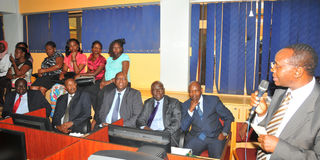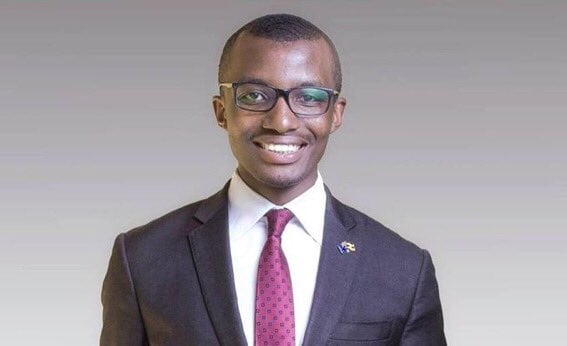Prime
Monitor editor’s job is a snake pit

NMG Board chairman Wilfred David Kiboro addresses a joint meeting of Monitor board members and staff on July 19, 2013. PHOTO | FILE
Editing The (Daily) Monitor for one day and going back home still sane is like driving across Kampala several times without knocking, or getting knocked, by a boda boda. Yet, it happens, so we may as well call it “The Daily Miracle”. For The Monitor editor’s desk is a snake pit. Every move you make, can get you bitten.
My tenure as managing editor stretched from mid-2005 to late 2008, three years, which felt like three decades, and a record since my three predecessors after management was separated from ownership had only managed a year each. Although editing the Monitor is like running an independent national media elsewhere in the world, Uganda is not elsewhere in the world.
From the moment of waking up in the morning, the Monitor editor starts worrying about the ‘Three Masters’ who could undo him/her. In descending order of importance and ascending order of ability to hurt him/her; the Masters are the Public, the Employer and the State.
I would gauge the mood of Master Number 1 by hopping through the radio channels, answering phone calls and hitting the road to see the real people going about their daily hassles. Along the way to the office, I would gauge how the public was judging us from the way vendors were holding out the Monitor as compared to the competitor titles.
At the office, the email and the phone would tell me if the employer was unhappy. The morning review of the product would further reveal any sins committed. In publishing, as all media people know, your mistakes are hung out there to be seen unlike in medicine where the health workers’ mistakes are buried in the ground by the victim’s family. Even with digital media, screenshots travel faster than you can edit your blunders.
The mood of the state is the trickiest to gauge. First of all, not every phone call you get from the state is from the state. The state has factions and all purport to be the state, even the weakest/vulnerable who want to (mis)use the media to rescue their precarious situation. But one thing you learn sooner, or later, is that when the state is annoyed, they charge you, try you and pass sentence before you even know you have offended them. In a few cases, they exonerate you.
Factions in the establishment, particularly security, were always trying to trap us with false scoops (fake news did not start yesterday). One time, a young man sought a meeting with me through ‘trusted’ sources and when we met, he had old and fresh wounds, purporting to have just escaped from detention of a security organ he worked in. He had ‘hot’ info. The mistake the plotters made was to make the tip too good and we went the extra mile to verify it. There were several attempts to make us publishsensitive, but fake news.
There is a fourth force though – your own staff. Woe unto the editor who for even a minute forgets that the state has a number of agents in the staff, mainly reporters and certainly among the IT staff.
Again woe unto the editor who only sees the obvious informers, who indeed are informers but quite minor in the system where they are called ‘assets’ and are of less consequence. You only learn of the real spies long after they have done a lot of damage. Sometimes you never get to know them. The real ones are of any rank in the media house, and can even be above the editor.
But, again, it would be a careless state that doesn’t deploy eyes and ears in important institutions. The editor’s job is to not let them distort the news processing. I don’t think I succeeded in minimising their effect. In one episode I failed dismally – by giving an assignment to a reporter who always sounded critical of the establishment, not knowing that they were deeper in bed with it than any of the suspected spies. Skillfully and gradually they killed the assignment – and got handsomely rewarded.
In my three years at the Monitor, we handled real big stories like the return of [four-time presidential candidate] Dr Kizza Besigye from exile. I say “handled” because we managed to “send” our reporter to travel with him and sit with him on the Nairobi – Entebbe leg [of his home-bound flight]. You need to know your troops well as you assign – only a go-getter like Simon Kasyate could manage that even if there were people personally closer to KB than him on that flight.
As reporters at Entebbe International Airport were fighting to access the man who was certainly destined to prison, Simon was happily cruising to the newsroom like a cat that swallowed a canary, his story already bagged. Away from Uganda politics, Mr Kasyate got a Cardinal who had participated in the election of the immediate past Pope to narrate to him details of what happened in the Vatican Conclave before the white smoke was released! I don’t know of any other journalist (except maybe David Yallop of the “In God’s Name” fame) who managed such a feat in the history of the Catholic Church.
That period also had the removal of presidential term limits. It also was the time of the speediest deepening of corruption in Uganda. Whatever has been happening after 2006 was bound to happen. And if you see older journalists expressing surprise at anything, they are just going through the motions to look humanly surprisable.
One minister, who was named in a relatively small scandal worth only about a hundred million shillings sat across my desk and after taking a deep breath and said: “I became a thief after becoming a minister, but my colleague [names withheld] ... became a minister because he was a thief.”
Please, pray for the Monitor editors because when they go to meet their creator, He may ask why they published only 10 percent of what they discovered while investigating scandals – many of them even years before they happened.
Mr Buwembo was Managing Editor, 2005-2008





